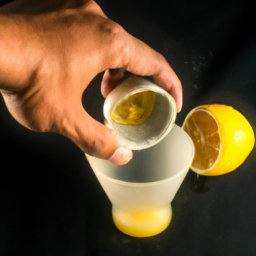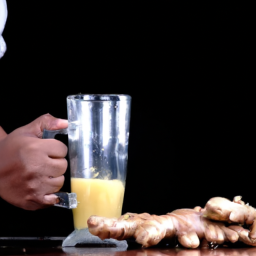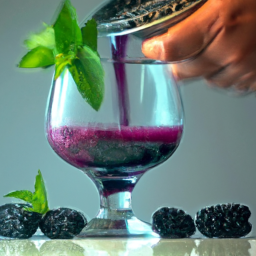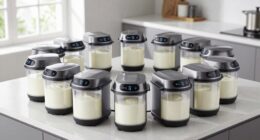Lemon juice is a key ingredient in many cooking and baking recipes, adding a zesty citrus flavor and acidity that elevates the taste of dishes. However, it can be challenging to measure the exact amount of lemon juice needed, particularly when a recipe calls for “half a lemon.”
How much juice does half a lemon actually yield? The answer is not always straightforward, and can vary depending on a variety of factors.
As a seasoned cook and baker, I have struggled with this question myself. I have squeezed countless lemons, hoping to get the perfect amount of juice, only to end up with too little or too much.
But fear not! In this article, I will dive into the science behind lemon juice yield, explore various techniques for extracting lemon juice, and provide tips for measuring and adjusting lemon juice to suit personal taste.
With these tips and tricks, you’ll be able to confidently add the perfect amount of lemon juice to any recipe, every time.
Key Takeaways
- The amount of lemon juice yielded can vary based on factors such as lemon variety, ripeness, and time of year.
- Techniques such as rolling, cutting, juicing, squeezing, and softening can be used to extract lemon juice.
- Measuring lemon juice accurately with cups or scales is important for recipe success.
- Lemon zest, extract, and concentrate can be used as substitutes for fresh lemon juice, and adjustments can be made to balance acidity and sweetness to personal taste.
Importance of Accurate Lemon Juice Measurements in Cooking and Baking
You might not realize it, but getting the right amount of lemon juice can make or break your dish, whether you’re baking a lemon tart or making a savory lemon sauce. That’s why it’s important to know how much lemon juice is in a half a lemon.
Accurate measurements can ensure you achieve the desired taste and acidity level in your recipe. Aside from cooking and baking, there are other uses of lemon juice beyond the kitchen. Lemon juice can be used as a natural cleaner, insect repellent, and even a lightening agent for hair.
Moreover, if you’re out of fresh lemons, there are substitutes you can use in baking, such as bottled lemon juice or vinegar. However, keep in mind that these alternatives may slightly alter the flavor of your dish.
With that said, let’s explore the factors affecting lemon juice yield.
Factors Affecting Lemon Juice Yield
When it comes to lemon juice yield, several factors come into play. These factors include the ripeness of the lemon, the season it was harvested, the variety of lemon, and its juiciness. As a cook, I’ve learned that these factors can significantly impact the amount of juice I can extract from a lemon.
For instance, a ripe lemon is likely to yield more juice than an unripe one, while the juiciness of a lemon determines how much juice it can produce. Understanding these factors is crucial to achieving consistent and accurate lemon juice measurements in cooking and baking.
Ripeness of the Lemon
If you’re looking to squeeze half a lemon, make sure it’s ripe as a peach! The ripeness of the lemon determines its acidity levels and juice yield.
A ripe lemon will have a thinner skin, a brighter yellow color, and a softer texture. The acidity levels will also be higher, making the juice more tart and flavorful.
On the other hand, an unripe lemon will have a thicker skin, a more muted yellow color, and a firmer texture. The acidity levels will be lower, resulting in a less tart and less flavorful juice.
So, before squeezing half a lemon, make sure it’s ripe enough to get the most juice and flavor out of it.
Transitioning into the next section, the season also plays a role in the ripeness of the lemon. During the peak season, which is typically from December to April, lemons are at their ripest and juiciest. However, even in the off-season, you can still find ripe lemons if you know what to look for.
Season
Interestingly, the season greatly affects the ripeness and flavor of this citrus fruit. Lemons are typically in season during the winter and early spring months, which is when they’re at their peak ripeness and tanginess.
During these months, the lemon juice will be more abundant and flavorful, making it perfect for adding a bright and zesty flavor to a variety of dishes. However, during the off-season, lemons may not be as juicy or flavorful, which can make it more difficult to get the desired amount of juice from half a lemon.
This is important to keep in mind when using lemon in non-seasonal dishes. Despite the potential challenges of using lemons outside of their peak season, there are many benefits to incorporating lemon juice into your diet year-round.
Lemon juice is high in vitamin C, which can help boost your immune system and improve your overall health. It also contains antioxidants, which can help protect your cells from damage caused by free radicals. Additionally, lemon juice has been shown to have anti-inflammatory properties, which can help reduce inflammation in the body.
With all of these health benefits, it’s no wonder that lemon juice is a popular ingredient in many different types of dishes. Moving on to the next section, let’s explore the different varieties of lemon and their unique characteristics.
Variety of Lemon
You’ll be amazed by the wide range of flavors and uses for the various types of lemons, from the sweet and floral Meyer lemon to the tart and acidic Eureka lemon. Meyer lemons are thought to be a cross between lemons and mandarins, resulting in a sweeter and less acidic taste than traditional lemons. In fact, Meyer lemons have been used in desserts and cocktails for their unique flavor profile.
On the other hand, Eureka lemons are the most common type found in grocery stores and are known for their high acidity levels, making them perfect for use in savory dishes and as a flavoring agent. When it comes to making lemon juice, the type of lemon used can make a big difference in the amount of juice extracted and the resulting acidity level.
Meyer lemons tend to produce less juice than Eureka lemons due to their thinner skin and lower acidity. However, the juice from Meyer lemons is typically sweeter and less tart than that of Eureka lemons. Understanding these differences can help you determine how much lemon juice is needed for a recipe and which variety of lemon is best suited for your dish.
Moving on to the next section, let’s discuss the juiciness of the lemon and how it can affect the amount of juice obtained.
Juiciness of the Lemon
Get ready to experience the joy of squeezing a perfectly juicy lemon that releases a burst of tangy flavor with every squeeze. The juiciness of a lemon can vary depending on a number of factors such as the variety of lemon, its ripeness, and even the time of year it was harvested. However, some lemons are naturally juicier than others.
Juiciness variations can affect the amount of lemon juice that can be extracted. To get the most juice out of a lemon, it’s important to use the right extraction method. Some popular methods include rolling the lemon on a hard surface to help break down the membranes inside, cutting the lemon in half and using a citrus juicer, or simply squeezing the lemon by hand. By experimenting with different methods, you can find which one works best for the juiciness level of your lemon. This will help you answer the question of how much lemon juice is in half a lemon.
Moving onto the subsequent section about techniques for extracting lemon juice, it’s important to note that the amount of juice extracted can also depend on the technique used.
Techniques for Extracting Lemon Juice
By simply rolling the lemon on a hard surface before cutting it in half, you’ll be able to extract more juice with ease. This technique helps to break down some of the cells within the fruit, allowing the juice to flow more freely when you squeeze it. If you’re looking for even more juice, you can also microwave the lemon for 10-15 seconds or place it in hot water for a few minutes before cutting it open. This will help to further soften the fruit and release more of the juice.
When it comes to extracting lemon juice, there are several techniques you can use that don’t involve a traditional lemon squeezer. One option is to use a fork to pierce the flesh of the lemon and twist it back and forth while squeezing the juice out. Another method is to simply squeeze the lemon with your hands, using your fingers to catch any seeds that may come out. Once you’ve extracted all the juice you need, be sure to store any leftover juice in an airtight container in the refrigerator. This will help to preserve the flavor and prevent it from going bad. With these techniques, you can easily extract and preserve lemon juice for all your cooking needs. Moving forward, let’s discuss how to measure the amount of lemon juice you’ve extracted.
Measuring Lemon Juice
After learning about the different ways to extract lemon juice, you might be wondering how much lemon juice you can get from half a lemon. This is an important question because recipes often call for specific amounts of lemon juice, and using too little or too much can affect the final product.
To measure lemon juice accurately, you can use a measuring cup or a kitchen scale. Here are some tips to help you measure the right amount of lemon juice:
- Cut the lemon in half and remove any seeds.
- Squeeze the lemon over a measuring cup or a bowl.
- If using a measuring cup, pour the juice through a strainer to remove any pulp or seeds.
- If using a kitchen scale, place a small bowl on the scale and zero it out, then squeeze the lemon juice into the bowl until you reach the desired weight.
Aside from measuring the lemon juice, you might also be wondering what to do with the leftover lemon halves. Don’t throw them away! There are many uses for leftover lemon halves, such as adding them to water for a refreshing drink, using them to scrub cutting boards or other surfaces, or placing them in the fridge to absorb odors.
If you don’t have any lemons on hand, you can also use lemon juice substitutes such as vinegar, lime juice, or citric acid.
Moving on to alternative lemon juice sources, there are several other fruits and vegetables that can be used as a substitute for lemon juice. Keep reading to learn more.
Alternative Lemon Juice Sources
If you’re in a pinch and don’t have any lemons on hand, there are a variety of fruits and vegetables that can be used as a substitute for that zesty flavor in your recipes. One popular alternative is bottled lemon juice, which is readily available at most grocery stores. However, it’s important to note that bottled juice may not provide the same level of freshness and quality as fresh squeezed lemon juice.
When using bottled lemon juice, it’s important to read the label and make sure it’s 100% pure lemon juice without any added sugars or preservatives. It’s also worth noting that fresh squeezed lemon juice has a stronger and more vibrant flavor than store bought juice. So, if you have the time and resources, it’s always best to opt for fresh lemons and squeeze them yourself.
As we move on to discussing lemon zest and other lemon flavorings, it’s important to keep in mind the importance of using fresh ingredients for the best possible flavor.
Lemon Zest and Other Lemon Flavorings
When adding a touch of citrus to your dishes, don’t forget about the bright and fragrant addition of lemon zest. This ingredient can be used in baking to add a subtle lemon flavor to cakes, cookies, and even bread.
Lemon zest can also be used to enhance the flavor of cocktails, providing a refreshing and tangy twist to classic drinks like the Margarita or the Gin and Tonic. In addition to lemon zest, there are other lemon flavorings that can be used in recipes calling for half a lemon.
Lemon extract, for example, can be used to add a concentrated burst of lemon flavor to baked goods and desserts. Lemon juice concentrate can also be used to add a tart and tangy flavor to dishes like marinades and dressings.
With these alternatives, you can still achieve the desired lemon flavor in your recipes without having to use a whole lemon.
Recipes Calling for Half a Lemon
You can elevate the flavor of your dishes by incorporating the zesty brightness of a lemon, even if the recipe only calls for a small amount. Here are some creative substitutions to make the most out of your leftover lemon halves:
-
Add it to your water – Drinking lemon water is a great way to improve digestion and boost your immune system. Slice up your leftover lemon and add it to a pitcher of water for a refreshing and healthy beverage.
-
Use it in marinades – Lemon juice is a great way to tenderize meat, and it adds a bright flavor to any marinade. Squeeze the juice from your leftover lemon half and mix it with olive oil, herbs, and spices for a delicious marinade.
-
Make lemon-infused oil – Lemon-infused oil is perfect for drizzling over salads or using as a dipping sauce for bread. Simply place your leftover lemon half in a jar of olive oil and let it sit for a few days to infuse.
Using these simple tricks, you can make the most out of your leftover lemon halves and add a burst of flavor to your dishes.
As for adjusting lemon juice measurements for personal taste, it’s important to remember that the acidity level of lemons can vary. Taste your dish as you add lemon juice and adjust accordingly, adding more or less to achieve the desired level of tartness.
Adjusting Lemon Juice Measurements for Personal Taste
Fine-tuning the tanginess of my dishes with a squeeze of citrus is a simple way to achieve culinary perfection and make my taste buds sing. But how much lemon juice is enough to achieve the right level of tartness? The answer lies in personal taste and experimenting with different fruits for flavor.
If I find that a dish is too sour, I can add sugar to balance out the acidity. Alternatively, I can also experiment with different citrus fruits such as lime or grapefruit to achieve a unique flavor profile.
With a little bit of trial and error, I can adjust lemon juice measurements to my liking and create dishes that are perfect for my palate.
When it comes to storing lemons and lemon juice, there are a few steps that I can take to ensure that they stay fresh and flavorful.
Storing Lemons and Lemon Juice
Proper storage is crucial in maintaining the freshness and flavor of citrus fruits like lemons. Here are some tips on storing lemons and lemon juice to prevent spoilage:
-
Keep lemons in a cool, dry place: Lemons are best stored at room temperature away from direct sunlight and heat. Exposure to heat and sunlight can cause the fruit to dry out and spoil quickly.
-
Store cut lemons in an airtight container: Once a lemon is cut, it starts to lose its freshness and flavor. To prevent this, store cut lemons in an airtight container in the refrigerator.
-
Freeze lemon juice: If you have excess lemon juice, freeze it in an ice cube tray. This way, you can easily use the lemon juice when needed without worrying about it spoiling.
-
Use fresh lemon juice within a week: While lemon juice can be stored in the refrigerator for up to two weeks, it’s best to use it within a week for optimal freshness and flavor. Proper storage can help you enjoy the tangy flavor of lemons in your dishes for longer.
Frequently Asked Questions
How long do lemons typically last before going bad?
I’ve found that storing lemons in a cool, dry place can preserve their freshness for up to a month. Signs of spoilage include mold, softness, and a sour smell. It’s important to discard any lemons that have gone bad to avoid foodborne illness.
Can you substitute bottled lemon juice for fresh lemon juice in recipes?
Yes, bottled lemon juice can be substituted for fresh lemon juice in recipes. The pros are convenience and longer shelf life, while the cons are a slightly different taste and less vitamin C. It’s important to adjust the amount used as bottled juice is often more concentrated.
How do you choose the best lemons for juicing?
To choose the best lemons for juicing, look for ones that are heavy for their size and have smooth, thin skin. Avoid any with soft spots or blemishes. Store in a cool, dry place.
Can you freeze fresh lemon juice for later use?
It’s possible to freeze fresh lemon juice for later use. To retain flavor, use airtight containers or freezer bags, and freeze immediately after juicing. Thaw in the refrigerator before using.
How do you clean and maintain a lemon juicer?
To effectively clean and maintain a lemon juicer, I recommend using warm soapy water and a soft brush to remove any residue. Popular brands include Breville and Citrus Juicer. Manual juicers offer a cheaper option but require more effort. Electric juicers are convenient but can be more expensive.
Conclusion
In conclusion, mastering the art of measuring lemon juice is key to achieving culinary perfection. From understanding the factors that affect yield to employing the right techniques for extraction, every detail counts.
It’s important to note that while half a lemon is a common measurement in recipes, it’s not always an exact science. Adjusting measurements to personal taste is crucial to achieving the desired flavor profile.
When it comes to storing lemons and lemon juice, a little care goes a long way. Proper storage ensures that the juice retains its flavor and nutritional value, allowing for a longer shelf life.
And, for those who are feeling adventurous, exploring alternative lemon juice sources, such as lemon zest and other flavorings, can add a whole new dimension to your culinary repertoire.
So, whether you’re whipping up a classic lemon meringue pie or experimenting with new recipes, remember that the key to success is in the details.









